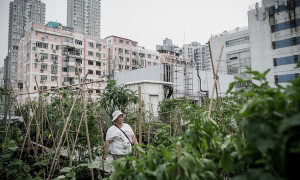by MARY HUI, The New York Times, October 3, 2012

Plots like the rooftop City Farm are sprouting across Hong Kong amid fears of tainted imports
Photo: Philippe Lopez (Agence France-Presse)
Source: The New York Times
HONG KONG — Kimbo Chan knows all about the food scandals in China: the formaldehyde that is sometimes sprayed on Chinese cabbages, the melamine in the milk and the imitation soy sauce made from hair clippings. That is why he is growing vegetables on a rooftop high above the crowded streets of Hong Kong.
“Some mainland Chinese farms even buy industrial chemicals to use on their crops,” Mr. Chan said. “Chemicals not meant for agricultural uses at all.”
As millions of Hong Kong consumers grow increasingly worried about the purity and safety of the fruits, vegetables, meats and processed foods coming in from mainland China, more of them are striking out on their own by tending tiny plots on rooftops, on balconies and in far-flung, untouched corners of highly urbanized Hong Kong.
“Consumers are asking, will the food poison them?” said Jonathan Wong, a professor of biology and the director of the Hong Kong Organic Resource Center. “They worry about the quality of the food. There is a lack of confidence in the food supply in China.”
Organic food stores are opening across the city, and there is growing demand in the markets for organic produce despite its higher prices. There are about 100 certified organic farms in Hong Kong. Seven years ago, there were none.
There is no official count of rooftop farms in Hong Kong, but they are clearly part of an international trend. New York has many commercialized rooftop farms established by companies like Gotham Greens, Bright Farms and Brooklyn Grange. In Berlin, an industrial-size rooftop vegetable and fish farm is in the pipeline. In Tokyo, a farm called Pasona O2 takes urban farming a step further: Vegetables are grown not only on roofs, but also in what was an underground bank vault. […]
See also: